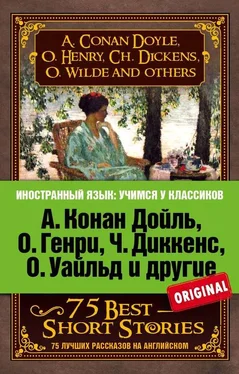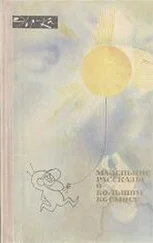Saunders was standing with his glass half raised. ‘It can get in,’ he said hoarsely; ‘it can get in! We’ve forgotten. There’s the fireplace in my bedroom. It will come down the chimney.’
‘Quick!’ said Eustace, as he rushed into the other room; ‘we haven’t a minute to lose. What can we do? Light the fire, Saunders. Give me a match, quick!’
‘They must be all in the other room. I’ll get them.’
‘Hurry, man, for goodness’ sake! Look in the bookcase! Look in the bathroom! Here, come and stand here; I’ll look.’
‘Be quick!’ shouted Saunders. ‘I can hear something!’
‘Then plug a sheet from your bed up the chimney. No, here’s a match.’ He had found one at last that had slipped into a crack in the floor.
‘Is the fire laid? Good, but it may not burn. I know – the oil from that old reading-lamp and this cotton-wool. Now the match, quick! Pull the sheet away, you fool! We don’t want it now.’
There was a great roar from the grate as the flames shot up. Saunders had been a fraction of a second too late with the sheet. The oil had fallen on to it. It, too, was burning.
‘The whole place will be on fire!’ cried Eustace, as he tried to beat out the flames with a blanket. ‘It’s no good! I can’t manage it. You must open the door, Saunders, and get help.’
Saunders ran to the door and fumbled with the bolts. The key was stiff in the lock.
‘Hurry!’ shouted Eustace; ‘the whole place is ablaze!’
The key turned in the lock at last. For half a second Saunders stopped to look back. Afterwards he could never be quite sure as to what he had seen, but at the time he thought that something black and charred was creeping slowly, very slowly, from the mass of flames towards Eustace Borlsover. For a moment he thought of returning to his friend, but the noise and the smell of the burning sent him running down the passage crying, ‘Fire! Fire!’ He rushed to the telephone to summon help, and then back to the bathroom – he should have thought of that before – for water. As he burst open the bedroom door there came a scream of terror which ended suddenly, and then the sound of a heavy fall.
Dr. Heidegger’s Experiment (Nathaniel Hawthorne)
That very singular man, old Dr. Heidegger, once invited four venerable friends to meet him in his study. There were three white-bearded gentlemen, Mr. Medbourne, Colonel Killigrew, and Mr. Gascoigne, and a withered gentlewoman, whose name was the Widow Wycherly. They were all melancholy old creatures, who had been unfortunate in life, and whose greatest misfortune it was that they were not long ago in their graves. Mr. Medbourne, in the vigor of his age, had been a prosperous merchant, but had lost his all by a frantic speculation, and was now little better than a mendicant. Colonel Killigrew had wasted his best years, and his health and substance, in the pursuit of sinful pleasures, which had given birth to a brood of pains, such as the gout, and divers other torments of soul and body. Mr. Gascoigne was a ruined politician, a man of evil fame, or at least had been so till time had buried him from the knowledge of the present generation, and made him obscure instead of infamous. As for the Widow Wycherly, tradition tells us that she was a great beauty in her day; but, for a long while past, she had lived in deep seclusion, on account of certain scandalous stories which had prejudiced the gentry of the town against her. It is a circumstance worth mentioning that each of these three old gentlemen, Mr. Medbourne, Colonel Killigrew, and Mr. Gascoigne, were early lovers of the Widow Wycherly, and had once been on the point of cutting each other’s throats for her sake. And, before proceeding further, I will merely hint that Dr. Heidegger and all his foul guests were sometimes thought to be a little beside themselves, – as is not unfrequently the case with old people, when worried either by present troubles or woeful recollections.
‘My dear old friends,’ said Dr. Heidegger, motioning them to be seated, ‘I am desirous of your assistance in one of those little experiments with which I amuse myself here in my study.’
If all stories were true, Dr. Heidegger’s study must have been a very curious place. It was a dim, old-fashioned chamber, festooned with cobwebs, and besprinkled with antique dust. Around the walls stood several oaken bookcases, the lower shelves of which were filled with rows of gigantic folios and black-letter quartos, and the upper with little parchment-covered duodecimos. Over the central bookcase was a bronze bust of Hippocrates [279], with which, according to some authorities, Dr. Heidegger was accustomed to hold consultations in all difficult cases of his practice. In the obscurest corner of the room stood a tall and narrow oaken closet, with its door ajar, within which doubtfully appeared a skeleton. Between two of the bookcases hung a looking-glass, presenting its high and dusty plate within a tarnished gilt frame. Among many wonderful stories related of this mirror, it was fabled that the spirits of all the doctor’s deceased patients dwelt within its verge, and would stare him in the face whenever he looked thitherward. The opposite side of the chamber was ornamented with the full-length portrait of a young lady, arrayed in the faded magnificence of silk, satin, and brocade, and with a visage as faded as her dress. Above half a century ago, Dr. Heidegger had been on the point of marriage with this young lady; but, being affected with some slight disorder, she had swallowed one of her lover’s prescriptions, and died on the bridal evening. The greatest curiosity of the study remains to be mentioned; it was a ponderous folio volume, bound in black leather, with massive silver clasps. There were no letters on the back, and nobody could tell the title of the book. But it was well known to be a book of magic; and once, when a chambermaid had lifted it, merely to brush away the dust, the skeleton had rattled in its closet, the picture of the young lady had stepped one foot upon the floor, and several ghastly faces had peeped forth from the mirror; while the brazen head of Hippocrates frowned, and said, – ‘Forbear!’
Such was Dr. Heidegger’s study. On the summer afternoon of our tale a small round table, as black as ebony, stood in the centre of the room, sustaining a cut-glass vase of beautiful form and elaborate workmanship. The sunshine came through the window, between the heavy festoons of two faded damask curtains, and fell directly across this vase; so that a mild splendor was reflected from it on the ashen visages of the five old people who sat around. Four champagne glasses were also on the table.
‘My dear old friends,’ repeated Dr. Heidegger, ‘may I reckon on your aid in performing an exceedingly curious experiment?’
Now Dr. Heidegger was a very strange old gentleman, whose eccentricity had become the nucleus for a thousand fantastic stories. Some of these fables, to my shame be it spoken, might possibly be traced back to my own veracious self; and if any passages of the present tale should startle the reader’s faith, I must be content to bear the stigma of a fiction monger.
When the doctor’s four guests heard him talk of his proposed experiment, they anticipated nothing more wonderful than the murder of a mouse in an air pump, or the examination of a cobweb by the microscope, or some similar nonsense, with which he was constantly in the habit of pestering his intimates. But without waiting for a reply, Dr. Heidegger hobbled across the chamber, and returned with the same ponderous folio, bound in black leather, which common report affirmed to be a book of magic. Undoing the silver clasps, he opened the volume, and took from among its black-letter pages a rose, or what was once a rose, though now the green leaves and crimson petals had assumed one brownish hue, and the ancient flower seemed ready to crumble to dust in the doctor’s hands.
Читать дальше
Конец ознакомительного отрывка
Купить книгу












